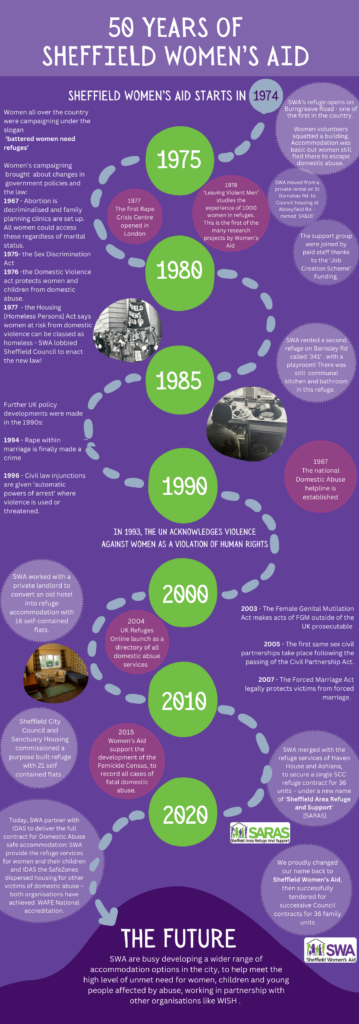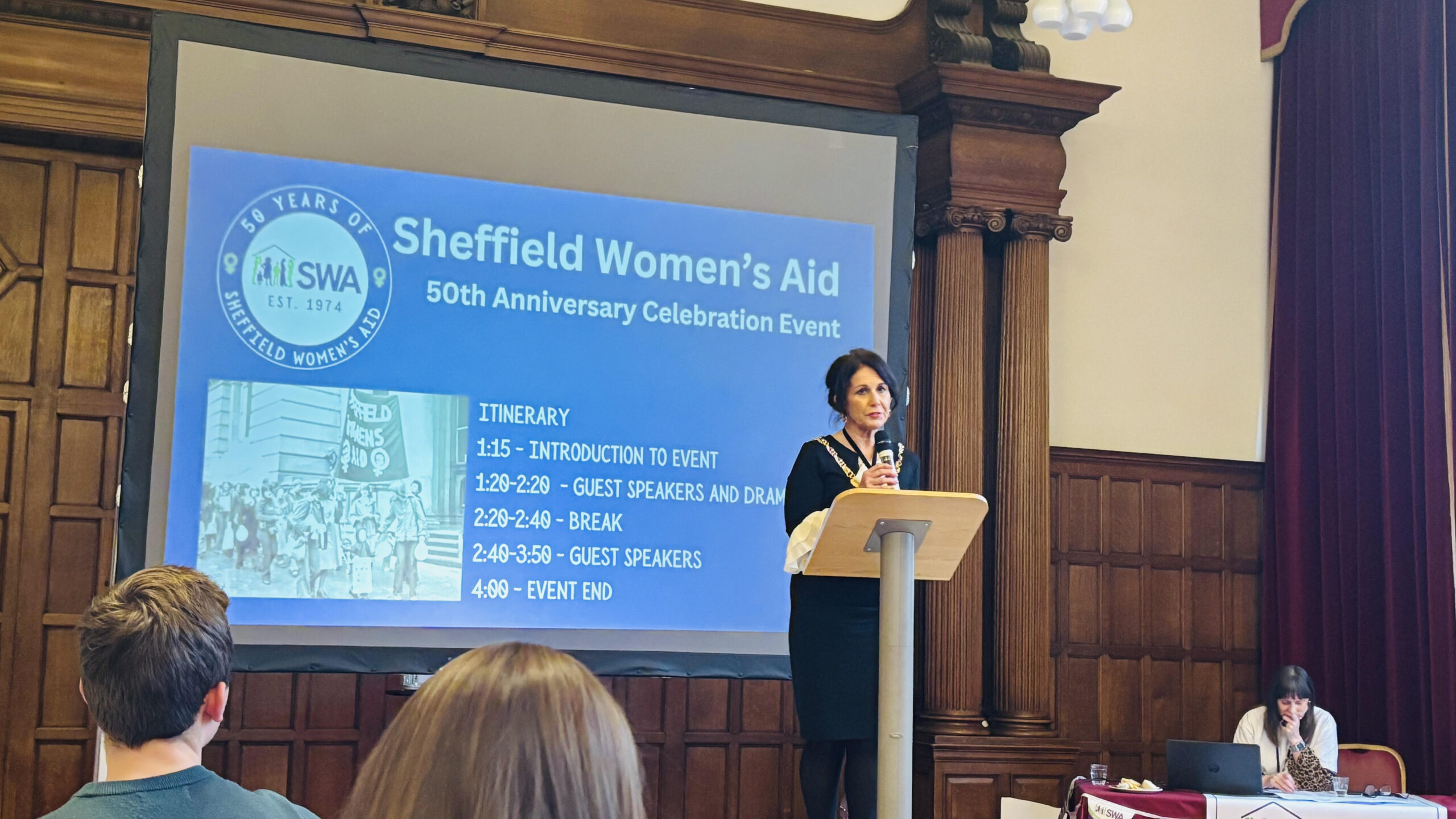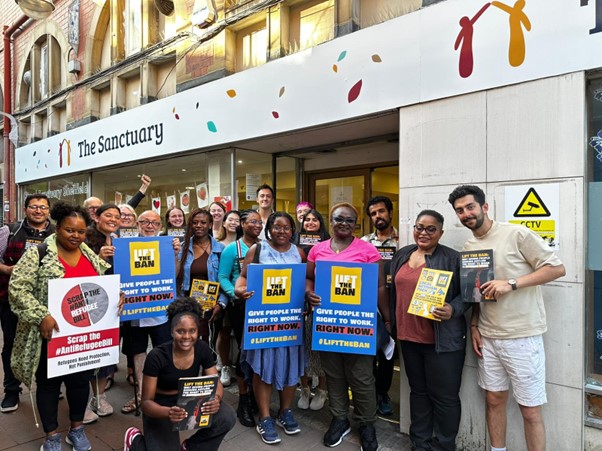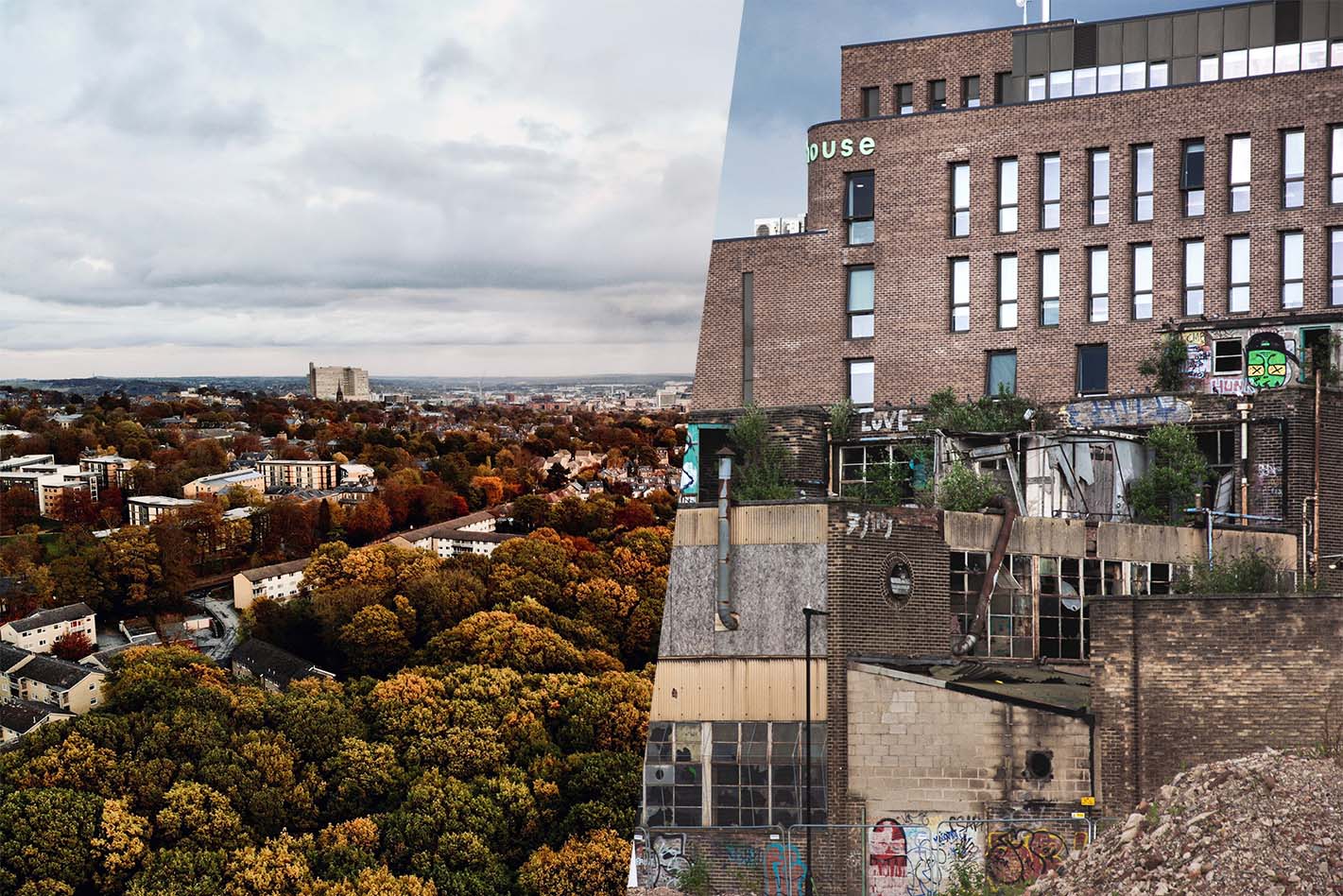For 50 years, Sheffield Women’s Aid has been a lifeline for survivors of domestic abuse, providing refuge to women and their children, as well as reshaping attitudes around gender-based violence.
Despite the ongoing work to help those impacted by violence against women and girls (VAWG) the problem has been classed as a societal epidemic by UK police.
This week’s 50th anniversary is bitter-sweet for Chief Executive, Hollie Venn.
She says: “It’s a real privilege for me to be in this role at the time we are 50, but it’s very sad that we are still here, we shouldn’t still be here. There have been changes in social attitudes and as a society we know it’s unacceptable.
“We are more in agreement now that domestic violence is not just something that happens behind closed doors.”
In spite of positive changes in attitudes towards domestic violence, there are still over 85,000 adults living in Sheffield who have experienced domestic abuse since the age of 16, according to Sheffield City Council.
Sheffield Women’s Aid is committed to offering a safe space for survivors and their children. They provide two separate housing units with self-contained flats for 36 women and their children.
How VAWG still needs to be tackled
While there have been positive changes in the past 50 years, Ms Venn believes there’s still a long way to go, with technology and social media presenting new challenges.
She says: “What I don’t think we could have anticipated is the rise in hatred towards women that has definitely been creeping up over the past few years.
“There has been a big set back in societal attitudes because of people like Andrew Tate. I think social media has a large responsibility for that.
“Many young boys just parrot what they hear on social media.”
Research by Women’s Aid in 2023 found that, among youths aged 7–25 years, boys are more likely than girls to be exposed to gendered hateful content on social media, and that this exposure is linked to unhealthy attitudes towards relationships.
The solution, Ms Venn believes, lies in education. She emphasised the need for efforts and resources to be invested in schools to educate young children about the importance of respecting women.
Social media isn’t all negative, though. The platforms have also helped to create a positive impact on shaping positive attitudes towards gender-based violence.
Ms Venn says: “What is really heartening is when I see a lot of young women posting on social media about feminism and pushing back on the misogyny they experience.”
Recent high profile domestic abuse cases, such as Gisèle Pelicot, who was raped by her husband and over 50 men while she was incapacitated, have sparked solidarity among women and reduced stigma around domestic abuse, with social media users promoting slogans like “shame must change sides”.
Despite the challenges, Sheffield Women’s Aid remains optimistic about the future and the impact they strive to have. The charity is currently developing a range of accommodation and working in partnership with organisations like WISH to meet the high demand for women and children affected by abuse.
Sheffield Women’s Aid shaping change
The charity has been at the forefront of influencing life-changing legislation making the UK safer for women.
Their impact dates back to 1977, when they successfully lobbied for Sheffield City Council to allow female survivors of domestic violence to be classified as homeless, granting them access to housing support. In 2015, they supported the development of the Femicide Census, which recorded all fatal domestic abuse cases.
One of the biggest milestones in legislation during Sheffield Women’s Aid’s existence was the passing of the Domestic Abuse Act in 2021.
Ms Venn said the introduction of this major bill was the result of years of campaigning from Sheffield and other branches of Women’s Aid.
The Act provided the first ever statutory definition of domestic abuse, finally recognising the existence of emotional and psychological harm, economic abuse, and coercive control.
Julie O’Rourke, a Lead Practitioner at Sheffield Women’s Aid, explained: “The domestic abuse bill made a lot of changes. Coercive control was rarely spoken about before, it’s a big milestone that the different forms of abuse are now being recognised.”
According to Women’s Aid, 43,774 offences of coercive control were recorded by the police in England and Wales (excluding Devon and Cornwall) in the year ending March 2023.
Maureen Storey, added that it’s vital that people are now connecting the different forms of abuse women face.
She said: “A lot of the success from the women’s movement has been getting people to join up the dots. We need to respond more assertively to ‘minor’ offences like upskirting, sexual harassment, and indecent exposure. When men get away with those things, they ramp it up.
“If we start calling those things out, which has been happening, that will reduce the more serious kinds of offending that happen.”
The History of Sheffield Women’s Aid
With roots in the Women’s Liberation Movement of the 1970s, Sheffield Women’s Aid began as a volunteer-run housing unit for women fleeing abusive partners.
Maureen Storey, who retired as a trustee of the charity this week, first began working with the organisation during the Women’s Liberation movement.
“Women’s Aid seemed like the group that was going to make the biggest difference to women’s lives,” she says.
Until help was provided, during the first half of the twentieth-century, female survivors of domestic violence in the UK had little option but to remain living with their abuser.
In 1974, Sheffield Women’s Aid opened its doors on Burngreave Road, providing one of the first safe spaces in the country for survivors of domestic abuse to live.
Since then, Sheffield Women’s Aid has grown from a voluntary organisation to a council-funded charity, providing housing and self contained flats for women and their children who have escaped abusive relationships.
Ms O’Rourke says: “Now when women walk in they can’t believe their eyes, they think it’s wonderful to have this safe space to themselves.”
Their mission remains the same: to offer a place of refuge for survivors of domestic abuse and their children.





